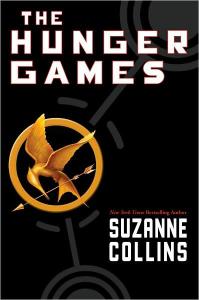Less than a week ago I wrote a post about how I was going to read The Hunger Games because a large percentage of the students in our high school ministry have. Since publishing that post I’ve found the time necessary to work my way through Suzanne Collins’ novel. Overall I thought the book was all right. It wasn’t the worst book I’ve read but not nearly the best, either. Below are some reflections I had while reading the book.
Katniss > Bella
The overwhelming majority of our students that have read The Hunger Games are girls. I can see why girls are drawn to the book. Katniss Everdeen is a strong, female character, far stronger than Bella Swan in Twilight. Bella’s main purpose in Twilight seems to be swooning and getting into trouble so Edward can rescue her. Through The Hunger Games Katniss does need some saving but she also plays the role of action hero/savior. Katniss does have her teenage girl moments of swooning and trying to decide how she really feels about the boy. There’s more to her character than those moments, though, and her inherent strengths manage to shine through those moments. I appreciate that Collins has crafted a character who is more of a role model for young girls than Stephanie Meyer did with Bella Swan.
Teenage Love
Without giving too much away, The Hunger Games not only revolves around 24 teenagers trying to kill each other, but it also revolves around a love story between Katniss and her fellow tribute from District 12, Peeta Mallark. I’m not a teenage girl so the romance plot and Katniss’ confusion over her relationship with Peeta didn’t interest me that much. The biggest problem I have with the love story in The Hunger Games, really any love story involving adolescents, is that they don’t really know what it means to love someone. I’ve spent over 12 years working with adolescents and I’ve heard them throw out the phrase “I love you” so much but rarely do they fully understand what it means. I know that they do love their family and friends wholeheartedly. But truly loving someone like Peeta loves Katniss or Bella loves Edward, is very rare to see in adolescents.
Substitutionary Atonement
As Adam insightfully pointed out in a comment on my last post about The Hunger Games, Katniss volunteering to take her sister’s place in the Hunger Games is a great image of substitutionary atonement. Katniss’ younger sister, Prim, was selected for the Hunger Games. Katniss, however, intervened on Prim’s behalf and took her place. Katniss’ sacrifice earns the respect of everyone in her district even though it could ultimately lead to her death. As an allegory for Christ’s redemptive work, we are all Prim and Jesus is Katniss, sacrificing himself on our behalf. Unlike Katniss, though, Jesus’ sacrifice leads to death and ultimately life for us.
The Hunger Games was a good enough read and kept me turning the pages while I read it on the elliptical. I am somewhat intrigued to find out what happens in the next book, Catching Fire, but it can wait. I can only take so much teenage girl drama and, working with students, I already get enough of that as it is.
What did you think about the book, The Hunger Games?


I read the first book in this series and I liked it.
Huh, I thought you might like it more than you did once you got into it. Your comments sound to me like you are really having a problem with the large number of teenage girls who are into the book. It doesn’t read like a stereotypical “girls’ book” (not your phrase) to me at all, and the “teenage girl drama” you do mention (a pretty dismissive phrase) – well, I dunno, usually that phrase doesn’t evoke literally life or death states, affirmations of the individual’s worth against a repressive tyrannical regime, etc. The first book has some really weighty themes, especially in regards to how the poor of Panem are being forced to perform to amuse the rich and wealthy, in the games. I think a Jeremiah or an Ezekiel would have some really harsh words for these folks.
I do like your pointing out that Katniss is a far better role model than Bella, though, and, I agree, teens don’t always know what they’re talking about when they talk about love. Neither, of course, do lots of adults!
Now you’ve got me interested in re-reading! I am probably not going to see the film in the theater, but will definitely be checking it out on home video.
I really did like the poverty and justice issues present in the book. Unfortunately, since I view the world and the book through the lens of a youth pastor, I’m always thinking about our students. So even with the poverty issues, I wondered whether or not our students were able to see that the affluence we experience in America is like the affluence of the Capital.
That youth pastor lens also made me focus in more on the romance and drama because I know that’s what our students were looking at.
As always, thanks for your thoughts, Mike.
It’s going to be end of mine day, but before finish I am reading this wonderful article to improve my knowledge.